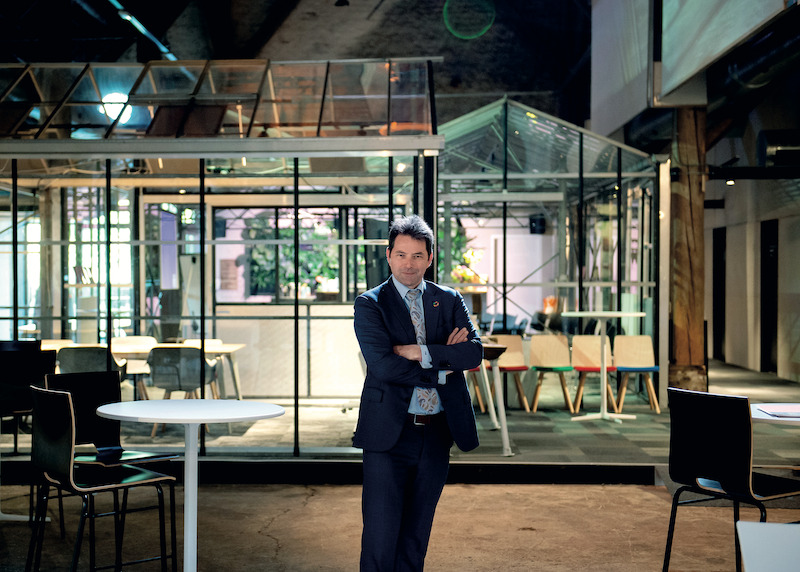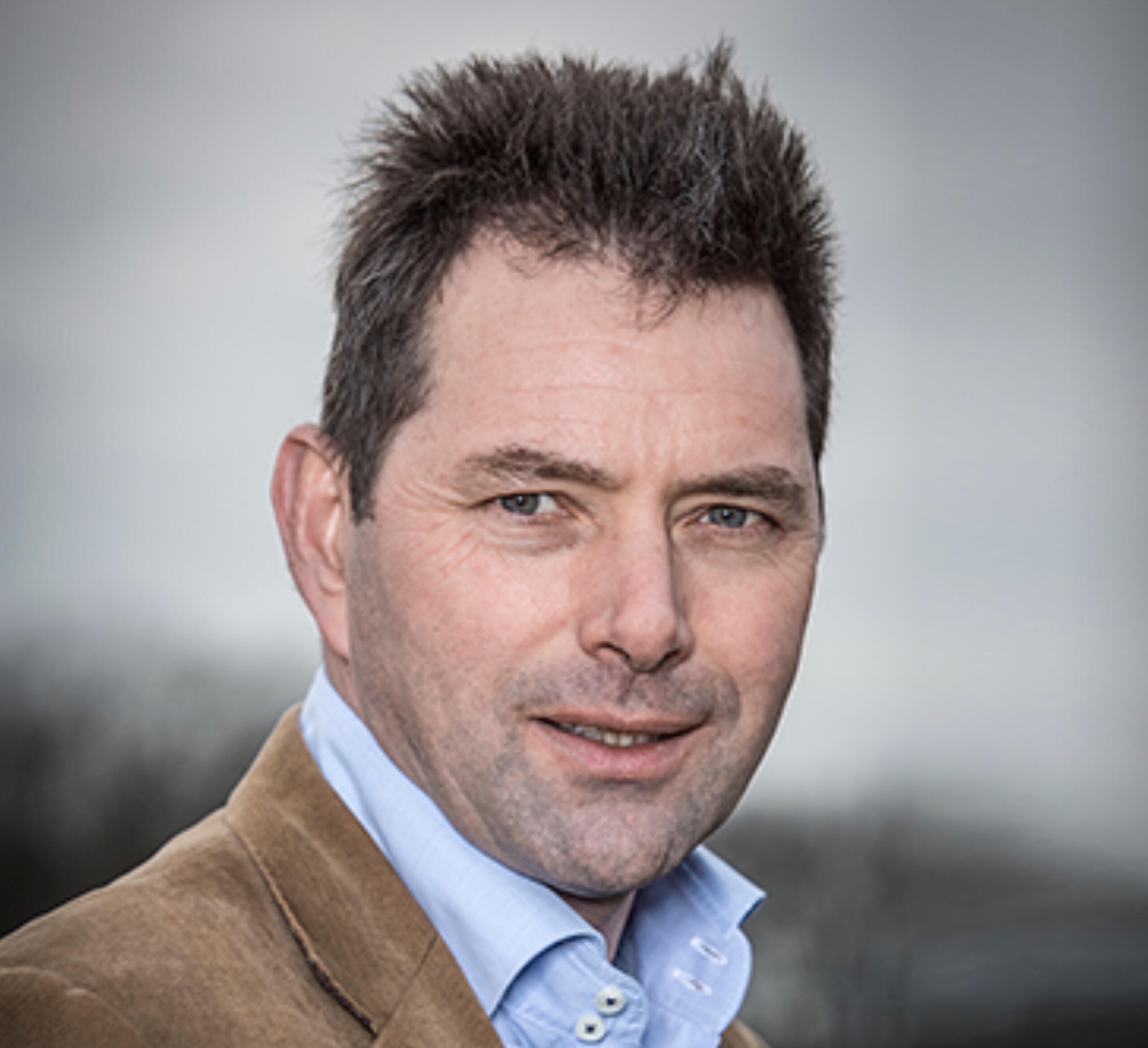Circuit Maker: Freek Van Eijk
May 06, 2021
The Dutch Government has committed to having an entirely circular economy by 2050. Freek Van Ejik believes that the circular economy may have started small, but it can grow into something big that creates jobs and offers a new way of life. His work has successfully spread awareness about sustainability and circular economy to make them known worldwide and invite people to participate in this change. Yet, he knows that there is a lot of work to do if we are to achieve climate neutrality or a fully circular country by 2050.
Learn about Holland Circular Hotspot director Freek Van Eijk, his successful journey in the circular economy sector!
This article was first published in the UK based Resource Magazine, Spring 2021, by Lidia Creech, here

“Sustainability is nice to have, but the economy is essential, and circular economy is about the economy and that’s what gives it momentum. It’s about jobs and it’s something you can identify with locally.”
Freek Van Eijk
"The Netherlands is leading the way in the transition to a circular economy"
The Netherlands is leading the way in the transition to a circular economy, with the Dutch Government committed to becoming fully circular by 2050. In the vanguard is Freek van Eijk, Managing Director of Holland Circular Hotspot, who spoke to Resource Magazine about his vision of how we transition to a sustainable future.
Freek Van Eijk is animatedly explaining how the paradigm of businesses aligning with sustainability should now be the only game in town. He adds: “80 percent of the world’s economy takes place in river deltas. Maybe the Dutch can cope with a metre rise in sea level, but for sure Bangladesh can’t. Other countries can’t.”
Freek van EijkHe is on a mission, a self-confessed evangelist who has found his calling. However, Freek Van Eijk’s path to this point began with almost three decades in the waste management industry, including as Director of Strategy at SUEZ Environment for 12 years, sitting on the boards of the Dutch Waste Management Association. He is also the founder and managing director of consultancy Acceleratio, which helped to initiate the first International ‘Green Deal’ between the Netherlands, UK, France, and Flanders with the aim to stimulate green growth in the North Sea region.
Although he has been working actively in SUEZ to grow its engagement with the circular economy, Van Eijk’s role had become increasingly international. So, five years ago he decided to follow his own path and commit to the sector, first starting his own company, then taking his current role as Director of Holland Circular Hotspot in June 2018.
Although the core concept has been around for decades since first coined by Walter Stahel, the locus of the circular economy can vary tremendously. For Freek Van Eijk, it imaginatively spans beyond the loop of materials, to cover renewable energy, preservation of biodiversity, social inclusiveness and new coalitions.
His focus is on business models that allow for a tangible and scalable benefit to all those that adopt the approach, from industry leaders to grassroots and local organisations. “It’s a very positive, scalable thing,” says Freek, “that’s the beautiful thing about the circular economy. It can start small and then it can scale. It takes people by the hand. It creates jobs not far away and that’s why I think politicians in Europe have adopted [it] because it’s strategic.”
He adds: “Sustainability is nice to have, but the economy is essential, and circular economy is about the economy and that’s what gives it momentum. It’s about jobs and it’s something you can identify with locally.”
Local ideas often support collaborative efforts, which is one of the reasons Van Eijk believes the circular economy has gained so much traction in the Netherlands. Working together is, he observes, in the Dutch DNA.
As a nation, the Netherlands has been spurred on through history to create innovative waste management solutions in response to the country’s hostile delta environment. “We started (very) early on with waste management, exaggerated with a drive towards incineration and turned back to recycling and CE. Today we only landfill two per cent of all waste,” explains Freek. “So now we’re saying hey, waste is actually the end of [the] pipe. We should look at the system change and preservation of value.”
With many national-level programmes and initiatives in the Netherlands working to accelerate a transition towards sustainability, Holland Circular Hotspot occupies a distinctive space due to its focus on making the circular economy happen at the international level. The organisation shares best practice from market segments such as agro-food and plastics; it shares tools and insight from other knowledge centres, with the aim of building a network of circular economy hubs around the world, which Van Eijk believes is vital in a world of international trade.
“The Netherlands had this huge ambition to be fully circular, but it doesn’t make sense if the rest of the world goes down the drain,” Van Eijk explains. For this reason, he identifies the opportunity and value of exporting expertise further afield.
Before the Covid-19 pandemic, Holland Circular Hotspot had been energetically making connections across the globe, including hosting a Saudi delegation and signing a partnership with Circular Slovakia in Bratislava in February 2020. Van Eijk says he almost became ‘a missionary for the circular economy’, having also recently completed a circular roadshow in Taiwan, whilst Holland Circular Hotspot saw a trade mission in Indonesia attended by the Dutch Queen, King and three ministers.
But the Covid-19 pandemic forced the Foundation to rethink the way it works and with travel restricted, it has focused on digital efforts whilst preparing for borders to be reopened. It is now working on expanding its international horizons further, working upon waste management and circular economy opportunities with eight countries across Latin America.
Van Eijk believes that the pandemic has made the dependencies and interconnectedness of the supply chain clearer, which is particularly prominent in Europe as it is a resource-poor continent. This is why he believes it is important that Europe continues to develop towards the circular strategy, as it will allow for resources and their value to be maintained.
I think it was the former CEO of Unilever, Paul Polman, who said that climate change is the biggest business opportunity of the century. I would say it’s climate change and the circular economy because we will need the circular economy anyhow
Freek Van Eijk
"Circular economy has always been urgent and time is really running out"
“But the circular economy has not become more urgent. It has always been urgent as hell and time is really running out,” he adds. “But Covid-19 has created awareness and awareness creates momentum. The awareness is at the industry level and awareness at the consumer level. The appreciation of clean air, that’s something we can build on. So, this has been a catalyst for the circular economy.”
Looking towards areas where the momentum of the circular economy could develop, Van Eijk picks out a topic that is particularly hot at the moment. It is, he notes, the recycling of plastic to the original building blocks of the material by means of a chemical process. It is a trending topic in waste management and a prominent research area in the Netherlands, where new initiatives are being launched across the country designed to supplement mechanical recycling with new chemical recycling opportunities for the 50 per cent of plastics that cannot be (mechanically) recycled today.
As with many developments in the circular economy, Van Eijk sees great potential in its scalability. “For the chemical industry, a million tonnes is nothing,” he explains. “If you look at the potential of the chemical industry entering an input market from a waste management perspective and scaling up and feeding the ‘cracker’ for instance in the petrochemical industry to make plastics, it will be a game-changer for waste management.”
Although a circular economy within chemical recycling could take 5-10 years to develop, Van Eijk expects it to match the size of mechanical recycling by 2030. According to a recent research paper published by the Dutch research group TNO, it will be possible to achieve 87 per cent circularity of plastics by 2050.
This is an area that Holland Circular Hotspot has already identified as key for the future, having recently hosted a webinar on the topic with North Rhine-Westphalia. It exemplifies the outward focus that the organisation has.
This article was taken from Issue 100
“We want to keep the movement going and make sure that we as a planet go towards climate neutrality in 2050 or fully circular in 2050 because if you now add up where we are today, it’s not enough what we are doing,” says Van Eijk. “We really need a major scaling up. That also means that the chemical industry will have to adopt a circular economy and that means chemical recycling will grow.”
When asked about the roles of other main actors, Van Eijk predicts that the circular economy will become a regulatory reality for all industries, especially in the EU where a lot of regulatory initiatives are already in the basket. Waste management has proved itself a logical first step for a circular economy, but the work of Holland Circular Hotspot shows that all actors across society need to be on board for a circular future.
The circular economy is a total system change. To make the transition, actions are required from all stakeholders. This, observes Freek, makes new cross-sectoral partnership inevitable. Governments set the ambition and experiment, but it’s across society where the action will take place.
So looking ahead, Van Eijk envisages that in the future of a circular economy, everybody has a role to play and collaboration will be key. With his wealth of knowledge on the circular economy, these are two key messages that Holland Circular Hotspot will continue to push forward in the years to come.
“We want to have impact. We want to inspire the world to go circular and create business opportunities for the Dutch in the process,” he concludes. “So that’s what we’re doing.”
